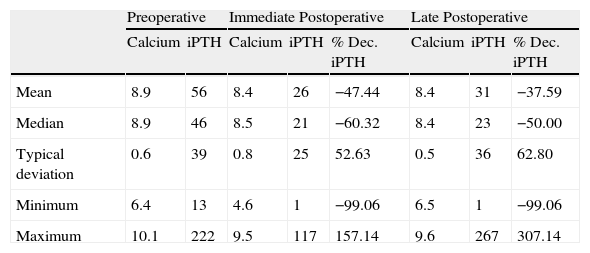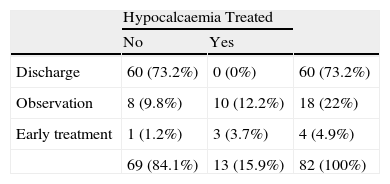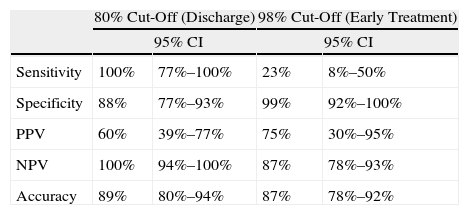The risk of developing hypocalcemia is the reason for prolonged hospitalisation after total thyroidectomy. The objective of this study was to validate parathyroid hormone measurement for predicting post-thyroidectomy hypocalcemia.
Material and methodsEighty-two patients who underwent total or completion thyroidectomy from February 2009 to March 2010 were enrolled in this prospective study to determine the best timing and cutoff point of parathyroid hormone to predict hypocalcemia. Patients with any condition that could interfere with calcium homeostasis were excluded from the survey. Parathyroid hormone and serum calcium levels were determined preoperatively, immediately after surgery and a number of hours later.
ResultsTreatment for hypocalcemia was required in 16.7% of patients. A percent of delayed decrease in parathyroid hormone was chosen as the best measurement to predict hypocalcemia. An 80% or higher decrease in delayed parathyroid hormone levels had 100% sensitivity (95% CI: 77.2%–100%) and 87% specificity (95% CI: 77%–93%) for selecting patients for early discharge. Using this test, 73.2% of the patients could have been discharged 24h after surgery. A 98% decrease in delayed parathyroid hormone levels could select candidates for early calcium replacement with 98.6% specificity (95% CI: 92.2%–99.7%).
ConclusionsThe decrease in postoperative delayed parathyroid hormone levels is a good predictor of post-thyroidectomy hypocalcemia. A decrease of 80% or more in delayed parathyroid hormone level is a test with excellent sensibility and specificity for selecting candidates for early discharge. The 98% cutoff point has high specificity for selecting patients for early calcium replacement.
El riesgo de hipocalcemia es el motivo para prolongar la hospitalización de los pacientes intervenidos de tiroidectomía. Nos planteamos validar la determinación de paratohormona intacta para predecir el desarrollo de hipocalcemia.
Material y métodosSe realizó un estudio prospectivo en 82 pacientes intervenidos de tiroidectomía total entre febrero de 2009 y marzo de 2010 para establecer el momento de la determinación y el punto de corte de paratohormona más predictivos de hipocalcemia. Los pacientes con condiciones que pudieran interferir con la homeostasis del calcio fueron excluidos. Se determinaron la paratohormona y los niveles de calcio séricos preoperatoriamente, en el postoperatorio inmediato y en el tardío.
ResultadosEl 16,7% de los pacientes presentaron hipocalcemia. La disminución tardía de paratohormona demostró ser la prueba más precisa para detectar hipocalcemia. El punto de corte para seleccionar candidatos al alta precoz se estableció en una disminución del 80%, con una sensibilidad del 100% (IC95%: 77,2-100%) y una especificidad del 87% (IC95%: 77-93%). Empleando esta prueba, el 73,2% de los pacientes podrían haber recibido el alta a las 24h de la cirugía. Se tomó como punto de corte para establecer candidatos a tratamiento precoz con calcio una disminución de la paratohormona del 98%, la especificidad fue del 98,6% (IC95%: 92,2-99,7%).
ConclusionesLa disminución tardía de paratohormona es un buen predictor de hipocalcemia postiroidectomía, que permite estratificar a los pacientes en tres grupos según su riesgo de hipocalcemia usando dos puntos de corte. El punto de corte del 80% presenta una sensibilidad y especificidad excelentes para seleccionar candidatos al alta hospitalaria precoz. El punto de corte del 98% presenta una alta especificidad para seleccionar candidatos a tratamiento precoz con calcio.














